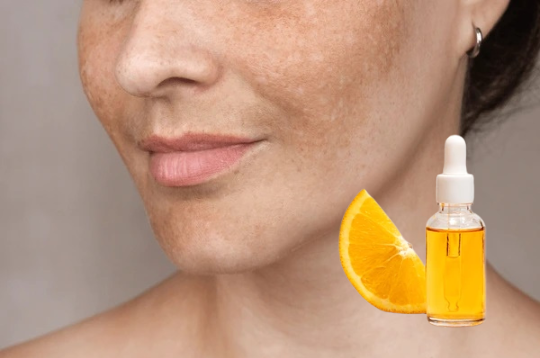
Vitamin C and Pigmentation: Why doesn’t it work for you?

07
Apr
Vitamin C and Pigmentation: Why doesn’t it work for you?
Vitamin C has long been celebrated in the world of skincare because of its light weight and ability to combat hyperpigmentation. Many people turn to Vitamin-C Ceres in the hopes of reaching even skin tones and reducing dark spots. However, not everyone is experiencing the desired outcome. If you ask yourself why Vitamin C doesn’t follow the promises about pigmentation issues, you’re not alone. Address possible reasons and look into alternative solutions. Understanding pigmentation
Pigmentation refers to the skin color that is primarily determined by melanin production. If melanin is produced during this process, this can lead to diseases such as hyperpigmentation, leading to dark stains and uneven skin tension.
The factors that contribute to hyperpigmentation are as follows:
Sunlight: UV rays stimulate the production of melanin and cause sun spots.
Hormonal changes: Conditions such as melasma are often caused by hormonal fluctuations.
Inflammation: It can occur after acne or skin damage and after post-inflammatory pigmentation. Aging: Due to skin that has been aging for a long time, age spots occur over time.
Vitamin C is known to inhibit melanin synthesis by regulating the activity of tyrosinase enzymes, which play an important role in melanin production. Nevertheless, many people have not seen the expected improvements.
Why Vitamin C is not effective for pigmentation
Incorrect language or concentration:
Stability Issues: Vitamin C, especially in the form of L-ascorbic acid, is notoriously unstable. Exposure to light and air affects its effectiveness and becomes ineffective. Insufficient concentration: For surprising results, concentrations between 10% and 20% are usually recommended. Low concentrations may not have the desired effect.
Inappropriate storage:
Vitamin C sale is sensitive to environmental factors. If it is not stored in an opaque, airtight container outside of sunlight, it can oxidize immediately and reduces its effectiveness.
Inconsistent use:
Achieve results requires consistent applications. Sporadicating use can hinder progression as vitamin C must be used regularly to effectively combat pigmentation.
Lack of sunscreen:
Using vitamin C without proper sunscreen can be counterproductive. UV exposure can exacerbate pigmentation problems, and the benefits of vitamin C are reduced without sunscreen.
Types of severe pigmentation:
Conditions such as melasma and deep skin pigmentation do not only respond well to topical vitamin C. These diseases often require more intensive treatment. Combination with incompatible ingredients:
Mixing vitamin C with certain ingredients such as benzoyl perpeoxide and alpha water oxygen (AHAS) can destabilize it, reduce its effectiveness, and cause skin irritation.
Alternative approaches to treat pigmentation
If Vitamin C does not achieve the desired results, consider the following treatments:
Chemical Shell:
These include chemical solutions for skin peeling, which promotes discontinuation of pigmented cells and displays fresh skin underneath.
Targeted laser therapy can reduce melanin deposits and effectively reduce pigmentation. However, choosing a laser and treatment protocol is extremely important to avoid side effects.

Topic Agent:
Components such as hydrothinone, codinate, and retinoids have been shown to be effective in treating hyperpigmentation by inhibiting melanin production and promoting cell turnover. Sunscreen:
Consistent use of broadband sunscreen agents with SPF of 30 or higher is important to prevent further pigmentation and protect the skin from UV-induced damage.
Professional advice:
If you are advised by a dermatologist, you can provide a personalized treatment plan. Clinics such as Midas Wellness Hub offer special services tailored to individual skin problems, including pigmentation issues.
The final thought
Vitamin C is a valuable component in the fight against pigmentation, but it is not a uniform solution. Understanding the limitations and factors that influence their effectiveness can help you set realistic expectations. To continue the pigmentation problem, alternative treatment and advice research on skincare professionals such as Midas Wellness Hub can provide a more targeted and effective solution.
Remember that it’s a journey to achieving clear and even skin that requires patience, consistency and a tailored approach.
FAQs
Vitamin C can brighten the pigmentation of light, but it may not be completely dark spots away, especially when in deep conditions or caused by underlying conditions.
Results vary, but consistent use is usually required over weeks or months to observe significant changes.
Yes, daily use is generally safe and recommended for best results. However, it is important to monitor your skin with signs of irritation.
Vitamin C is suitable for ingredients such as vitamin E and ferrulic acid, but should be used with care with retinoids or exfoliating acids to avoid irritation.
Vitamin C is suitable for most skin types, but can lead to irritation of sensitive skin. It is recommended to run a patch test before the complete application.

